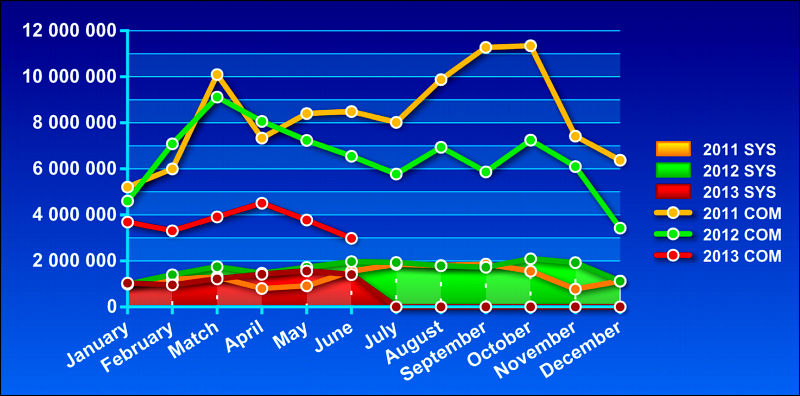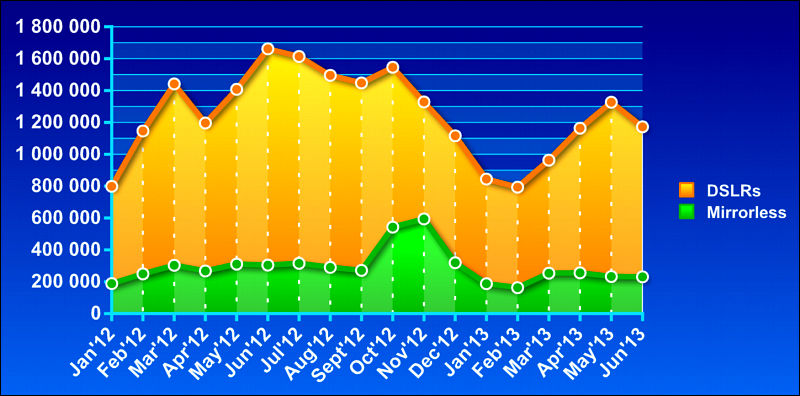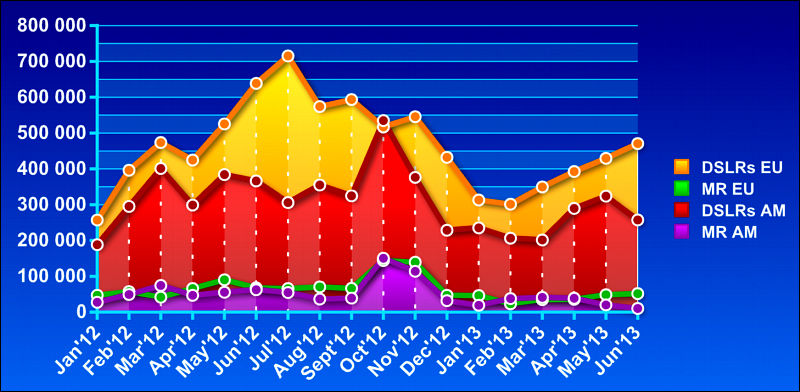
-
Addition by Sony
Decreased 10.4% year-on-year (a 26% decrease on a constant currency basis) to 173.6 billion yen (1,753 million U.S. dollars). This decrease was primarily due to a significant decrease in unit sales of video cameras and compact digital cameras reflecting a contraction of these markets, partially offset by the favorable impact of foreign exchange rates during the current quarter.
http://www.sony.net/SonyInfo/IR/financial/fr/13q1_sonypre.pdf
-
Even worse is that shipments to US in June is only 16.4% compared to 2012.
-
What a massacre. Who's gonna invest huge money on sensor technology if they can't sell well?
-
What a massacre. Who's gonna invest huge money on sensor technology if they can't sell well?
What else they have to do? May be make modular cameras?
-
Nikon Corp cut its full-year profit due to disappointing demand for mirrorless cameras that were once seen as a revolutionary invention that could save the industry from the threat of increasingly advanced smartphone cameras
Nikon executives said that sales were particularly disappointing in the United States and Europe for mirrorless cameras, which are lighter and cheaper than single-lens reflex (SLR) devices and offer higher image quality than other compact models.
Rival Olympus Corp said on Thursday that its sales of its signature mirrorless model, the PEN, had fallen 12 percent in the first quarter, below its expectations.
Okamoto warned that Nikon may have to rethink its product mix in other regions as falling prices for mirrorless cameras are pinching margins and hurting the interchangeable lens division even as SLR sales remained strong. It cut its full-year forecast for the division to 6.55 million units from 7.1 million.
http://uk.reuters.com/article/2013/08/08/us-nikon-earnings-idUKBRE9770EH20130808
-
Don't underestimate frugality of mirrorless users.
-
In late July, Canon, the world's largest maker of digital cameras by sales, cut its full-year net profit outlook by 10 percent to $2.6 billion for this year, citing declining digital camera sales amid an extended economic slump.
Canon, which claims 60 percent of the high-end digital single-lens reflex (DSLR) camera market in Korea, will target high-end consumers with its premium lineup including DSLR and “mirrorless” cameras, said Shin. “We will stick to premium, specialized point-and-shoot models” with features such as water-proofing and enabling nighttime photography.
Korea’s one trillion camera market consists of three segments ― DSLR, mirrorless and point-and-shoot. As they don’t carry a mirror-based viewfinder system, mirrorless cameras are thinner than point-and-shoot models but generate high-quality images. DSLR cameras cost up to 7.8 million won per model, followed by mirrorless cameras available at 600,000 won-1.3 million won and point-and-shoot models at 200,000 won-300,000 won.
Sony Korea and Samsung Electronics account for a combined 80 percent of the domestic mirrorless camera market, with Sony taking the lead with a 51 percent share.
“In the first half (of this year), DSLR and mirrorless cameras both with interchangeable lenses formed a market of 274,400 units (in Korea),” Sony spokeswoman Jang Ji-na said. “Mirrorless cameras are in high demand.”
The Korean mirrorless camera market is estimated to exceed 200,000 units this year, jumping from 8,537 in 2010, Sony said citing IDC data. Globally, IDC expects the mirrorless market to grow ten times to 13.11 million units in 2014 from 1.3 million in 2010.
Samsung is a latecomer to the camera market dominated by Japanese brands. But analysts say the electronic giant stands to gain from the convergence of smartphones and cameras despite economic uncertainty.
http://www.koreatimes.co.kr/www/news/tech/2013/08/133_140729.html
-
Makes me wonder on the wisdom of buying into m4/3 lenses...
-
Makes me wonder on the wisdom of buying into m4/3 lenses...
No need to wonder. especially as smart guys already use this to try doubt m43 :-)
All will be ok. -
@stonebat I don't think we have to worry about sensor technology unless we are some camera geeks. If someone cannot do amazing photography with the 36 mega-pixel D800 with it 14.5 stop of DR and very very good low light, then no matter what sensor tech he will have, will make him a better shooter. With the sensor tech in the toshiba D7100, Nikon could today make a 50-60 megapixel full frame camera. Now for video they just have to unleash the tech that is already inside those dslr like magic lantern has shown with 5dmark3 raw hack.
-
Makes me wonder on the wisdom of buying into m4/3 lenses...
For video, I think that m4/3 have a good future. The Blackmagic cameras shows that. For photos, I'm not so sure (and afraid).
-
For photos, I'm not so sure (and afraid).
What is wrong with photos?
-
What is wrong with photos?
Nothing. :) But "sensor size" is becoming the new megapixel race.
Why DSLRs are still selling much better than mirrorless? I guess that it's not professionals that are buying all these DSLR - and probably the bulk of them are low end DSLRs. Translating: users that are migrating from point&shoot and that wants a better camera.
These people reach more experienced photographers and ask about what camera to buy. And most of them will say "Only DSLR are serious cameras". The ones that knows other formats will say "m4/3 sensors are too small". I've talked with some photographers that doesn't even KNOW m4/3 cameras - their brains are hardwired in the Canon / Nikon duo. I've saw one saying that a NEX 3N is better than a Olympus OM-D "because the sensor is APS-C, the minimum acceptable size".
Then comes the talk about low ISO sensitivity and DOF of m4/3, and etc...For a lot of users, an m4/3 could be a better choice than an DSLR, but they are poisoned the photographers themselves.
I'm not bashing the DSLRs, they are better than mirrorless for some scenarios (fast action, some models are better in low light, VF preferences), but there is that mantra that only DSLRs could take good photos. The marketing form the companies are already not helping - only the OM-D gained some traction in the pro world, and more recently the Fuji X ones (I showed the mirrorless for a guy here at my job that was a Nikon enthusiast, that was thinking about buying a full frame - he bought an X-E1 and is insanely happy). But Panasonic, Olympus and Sony are lacking in this respect.
-
Why DSLRs are still selling much better than mirrorless? I guess that it's not professionals that are buying all these DSLR - and probably the bulk of them are low end DSLRs. Translating: users that are migrating from point&shoot and that wants a better camera.
Guys I asked personally mostly just assume that such size and form are right and is common for pro cameras. Plus you are buying more weight for same money :-)
-
Plus you are buying more weight for same money :-)
Hope that Panasonic is not reading this - or the GH5 will come with D800 size and 2 kg weight. :)
-
Koreans have been calling Canon "Ichiban" meaning the number one. But I'm sensing there's sign of major change happening in Korea, and Canon's Ichiban days are numbered. Samsung's CEO is targeting for #1 position at least domestically. I'm optimistic about Samsung's projection although I'm not a big fan of their products. Samsung and Sony have the best chance for developing the next generation sensor technologies for successful mass productions. Plus integration with their phones and tablets. No other company has such synergy.
-
I have two thoughts on this based on recent experiences:
was a camera convention with lots of workshops. Most of these workshops were given by really great pros, people who shot destination and celebrity weddings. Universally they shot Nikon d800 or canon 5d or 1d or something like that. And they frequently and snidely dissed mirrorless as not good enough. Except the top two guys teaching there, both Pulitzer Prize winning national geographic photographers, one of whom shot olympus om-d and the other of whom shot GH3. The crowd was filled with amateurs who were more concerned with specs than photos and almost all of them were lugging 5ds or d5200s or the like. Meanwhile, I had my om-d with three or four lenses and it still weighed less than their d5200 and kit lens. I've been shooting micro 4/3 professionally for a few years now, and know a few former leica shooters who do so as we'll, at a very high level. But for many people, they base their purchase decision on what looks like a professional camera.
I was at best buy recently waiting for my gf to pick out a new iPhone case (which can be two-hour process for her). I overheard a sales rep selling a man his first camera. The man wanted something with interchangeable lenses to take pictures of his kids. A mirrorless would have been perfect. Instead the sales rep showed him bulky dslr after bulky dslr, which looked like the best to him. The rep even told him canon would shoot better video than Nikon, and I wanted to flag the guy down and show him the nex-7, which for less money shoots better video than either of them. I've seen similar things in dedicated camera stores.
I think that the midrange people, working pros, camera store sales people, etc, have a vested interest in one system or another, because they're already invested in glass, they don't even give mirrorless a try. And that spills down to regular consumers (99% of dslrs are bought by non-pros, 90% of whom would be better suited with a point and shoot) who view it as a real camera. But pros for whom equipment cost is no issue, mirrorless is an excellent way to go.
Other than sports, I don't really know what niche dslrs still fill. An om-d is way better than a 5d for journalism, events, travel and nature, for the same reasons leica was back in the day. And studio photographers should be shooting medium format.
Howdy, Stranger!
It looks like you're new here. If you want to get involved, click one of these buttons!
Categories
- Topics List23,992
- Blog5,725
- General and News1,354
- Hacks and Patches1,153
- ↳ Top Settings33
- ↳ Beginners256
- ↳ Archives402
- ↳ Hacks News and Development56
- Cameras2,367
- ↳ Panasonic995
- ↳ Canon118
- ↳ Sony156
- ↳ Nikon96
- ↳ Pentax and Samsung70
- ↳ Olympus and Fujifilm101
- ↳ Compacts and Camcorders300
- ↳ Smartphones for video97
- ↳ Pro Video Cameras191
- ↳ BlackMagic and other raw cameras116
- Skill1,960
- ↳ Business and distribution66
- ↳ Preparation, scripts and legal38
- ↳ Art149
- ↳ Import, Convert, Exporting291
- ↳ Editors191
- ↳ Effects and stunts115
- ↳ Color grading197
- ↳ Sound and Music280
- ↳ Lighting96
- ↳ Software and storage tips266
- Gear5,420
- ↳ Filters, Adapters, Matte boxes344
- ↳ Lenses1,582
- ↳ Follow focus and gears93
- ↳ Sound499
- ↳ Lighting gear314
- ↳ Camera movement230
- ↳ Gimbals and copters302
- ↳ Rigs and related stuff273
- ↳ Power solutions83
- ↳ Monitors and viewfinders340
- ↳ Tripods and fluid heads139
- ↳ Storage286
- ↳ Computers and studio gear560
- ↳ VR and 3D248
- Showcase1,859
- Marketplace2,834
- Offtopic1,320











